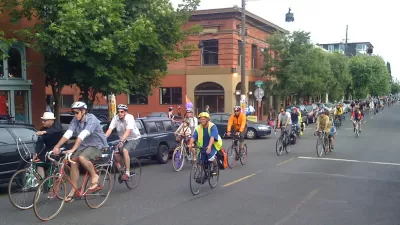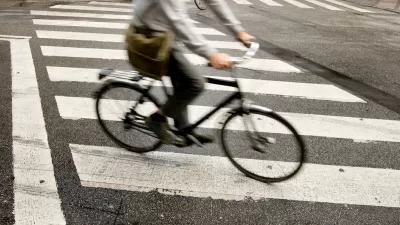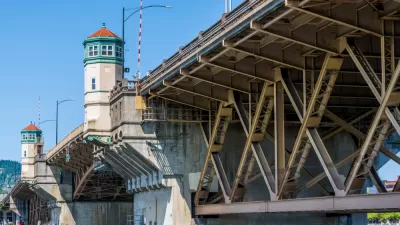A new light rail bridge spanning the Willamette River in Portland will include separate lanes for pedestrians and cyclists -- and no lanes for automobiles. But biker and pedestrian congestion remains a concern.
Advocates have called on planners to increase the width of the bike and pedestrian lanes in an effort to reduce the inevitable tensions that arise when many people are trying to use the same space.
"If the new bridge - car- and truck-free - works as planned, it could also relieve people congestion on the Hawthorne, just to the north.
Designers are building in room to roam and planning markings to separate commuters going at different speeds. Specifically, TriMet has committed to providing a 14-foot wide path for bicyclists and pedestrians on each side of the MAX bridge, far wider than the 10 1/2 feet lanes on each side of the Hawthorne. "
FULL STORY: New Willamette bridge to span cyclist-pedestrian chasm

Maui's Vacation Rental Debate Turns Ugly
Verbal attacks, misinformation campaigns and fistfights plague a high-stakes debate to convert thousands of vacation rentals into long-term housing.

Planetizen Federal Action Tracker
A weekly monitor of how Trump’s orders and actions are impacting planners and planning in America.

Chicago’s Ghost Rails
Just beneath the surface of the modern city lie the remnants of its expansive early 20th-century streetcar system.

Bend, Oregon Zoning Reforms Prioritize Small-Scale Housing
The city altered its zoning code to allow multi-family housing and eliminated parking mandates citywide.

Amtrak Cutting Jobs, Funding to High-Speed Rail
The agency plans to cut 10 percent of its workforce and has confirmed it will not fund new high-speed rail projects.

LA Denies Basic Services to Unhoused Residents
The city has repeatedly failed to respond to requests for trash pickup at encampment sites, and eliminated a program that provided mobile showers and toilets.
Urban Design for Planners 1: Software Tools
This six-course series explores essential urban design concepts using open source software and equips planners with the tools they need to participate fully in the urban design process.
Planning for Universal Design
Learn the tools for implementing Universal Design in planning regulations.
planning NEXT
Appalachian Highlands Housing Partners
Mpact (founded as Rail~Volution)
City of Camden Redevelopment Agency
City of Astoria
City of Portland
City of Laramie





























